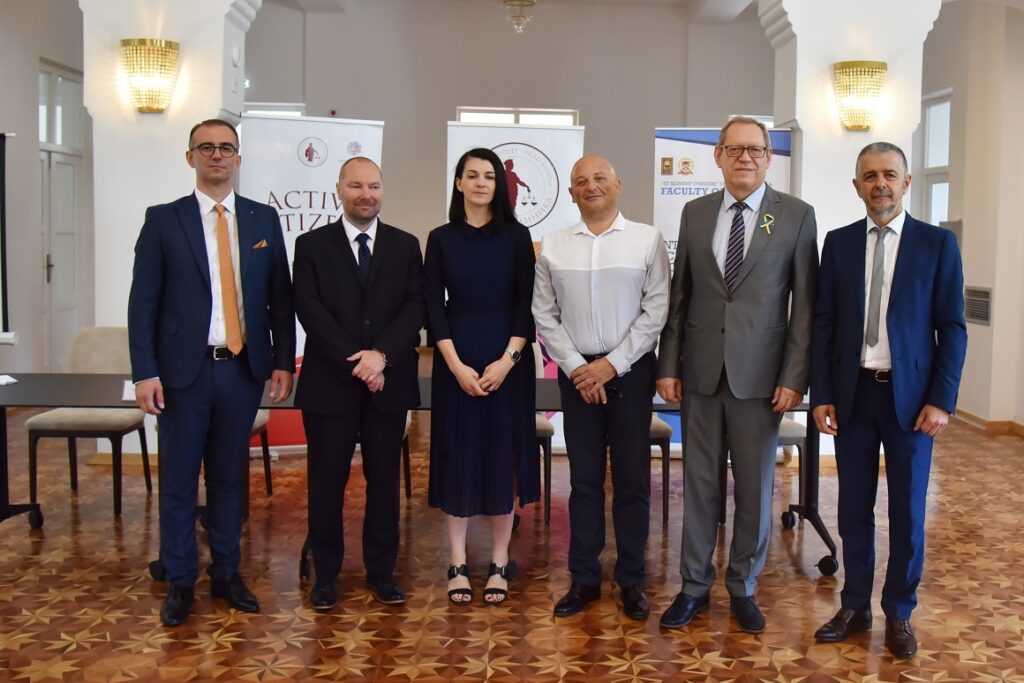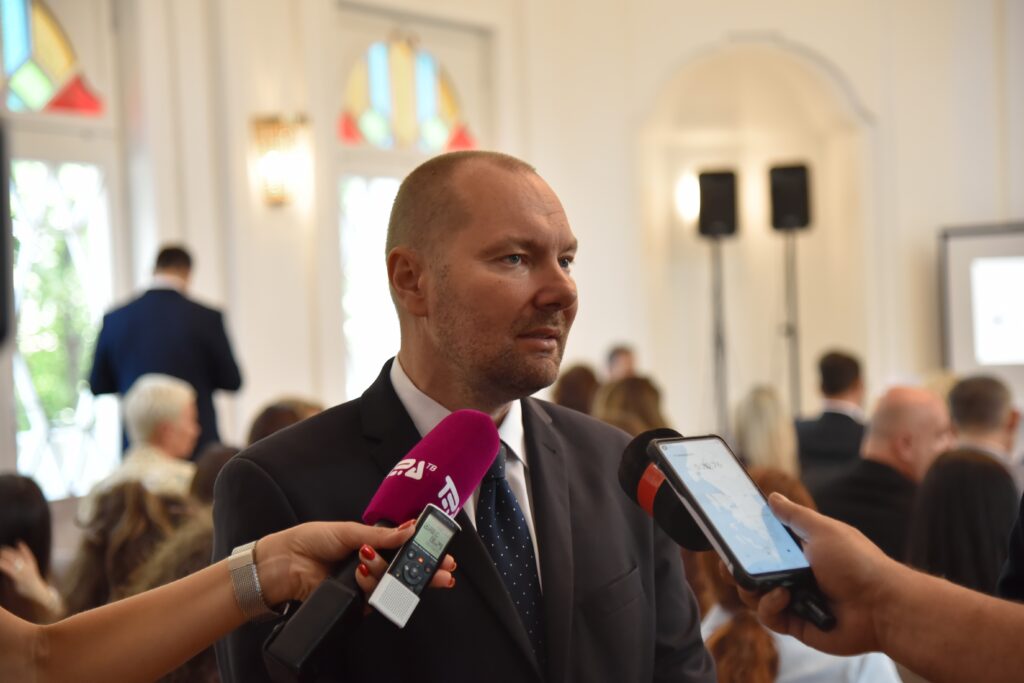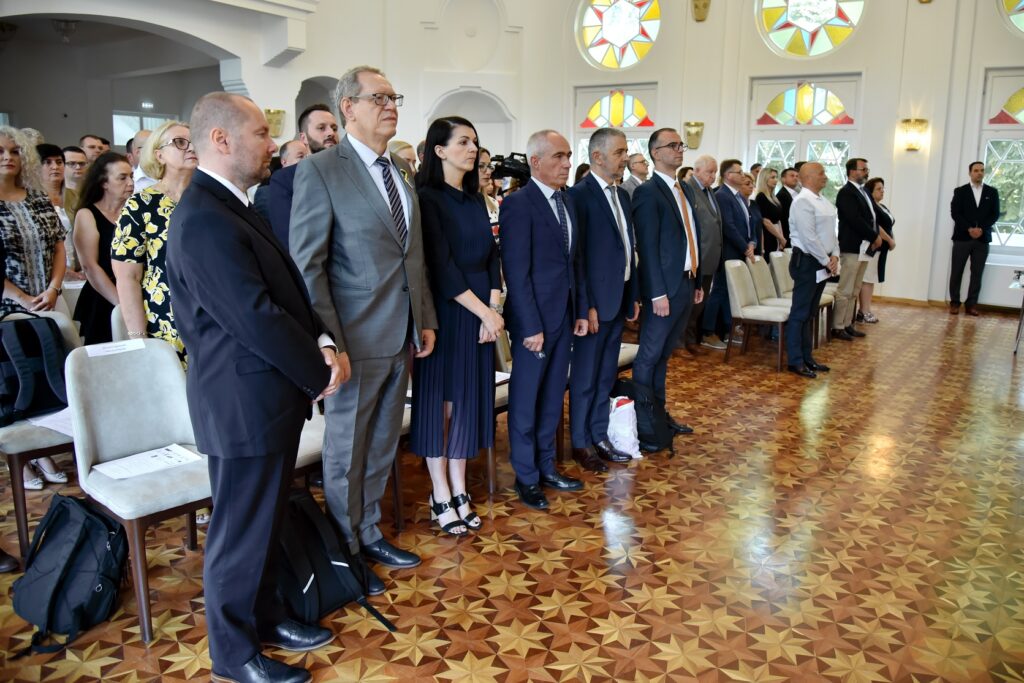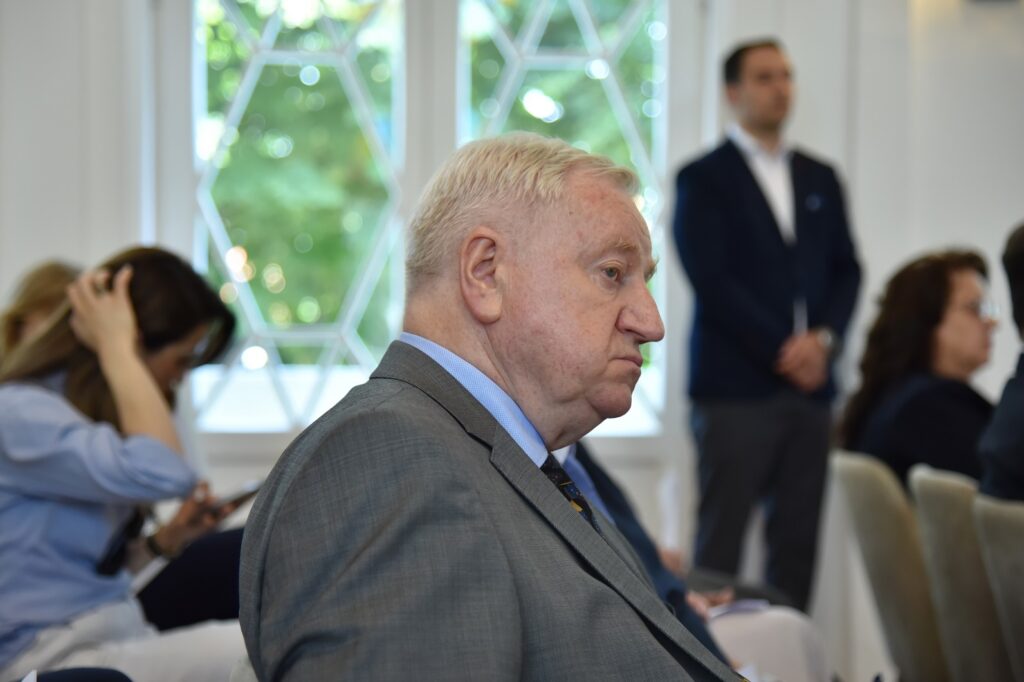International Conference and Workshop in Bitola (North Macedonia)
From June 30th to July 4th, a team of employees from the Centre for Europe, University of Warsaw (CEUW) and partners from the Centre for International Relations and the Faculty of Political Science and International Studies of the University of Warsaw, conducted a study and conference visit to North Macedonia as part of a grant from the Polish Ministry of Foreign Affairs. The main contractor of the grant was the CEUW.
On July 1st in Bitola, in the now beautifully restored Officers’ Palace, a one-day international conference was held, entitled „Poland and the Balkans in Europe – Successes and Challenges”. The conference was organised by the Centre for Europe as part of a grant entitled „Balkan Ambitions and Polish Inspirations” in the amount of PLN 164,846. This was a public task which was financed by the Ministry of Foreign Affairs of the Republic of Poland within a grant competition entitled “Public Diplomacy 2022”.
The main foreign institutional partner of the grant was the Faculty of Law „St. Kliment Ohridski” Universty – Bitola, with this Faculty being the main organiser of the conference. The other institutional partners were: the Centre for International Relations (Poland), the University of “Ss. Cyril and Methodius” Skopje, the University of Montenegro, the University of Niś (Serbia), along with the Institute for Research and European Studies (North Macedonia). The official carrier of the Polish guests to the conference was LOT Polish Airlines.
The conference was officially opened by Prof. Goran Ilik – Dean of the Faculty of Law of the University „St. Kliment Ohridski” – Bitola. The national anthems of Poland and North Macedonia were played, after which the honourable guests then took the floor in the following order: Prof. Sasho Korunovski – Rector of Bitola University, Dr. Toni Konjanovski – Mayor of Bitola, Prof. Kamil Zajączkowski – Director of CEUW, His Excellency Wojciech Tyciński – Ambassador of the Republic of Poland in North Macedonia and Prof. Bisera Kostadinovska-Stojcevska – Minister of Culture of North Macedonia. The conference gathered about 120 people together.
During the opening of the conference, Prof. Kamil Zajączkowski defined the main goals of the project financed by the Polish Ministry of Foreign Affairs. These goals are to primarily strengthen the position of Poland as a leader in the region of Central and Eastern Europe and South-Eastern Europe and to establish itself as a reliable partner and European ally for the Balkan states. As emphasised by Prof. Zajączkowski, it is in Poland’s vital interests to fully integrate the Balkan states into the Euro-Atlantic structures, as this would be an opportunity to stabilise this region of extreme conflict.
Then, as part of the conference, four panels were held, entitled:
– Panel 1, Poland and the Balkan States in the Face of Global Security Challenges,
– Panel 2, Poland’s Successes in the Implementation of Political and Economic Reforms,
– Panel 3, Poland’s Socio-Political Achievements as an Inspiration for Changes in the Balkan States
– Panel 4, Poland as a Leader of Social and Cultural Changes.
The participants of the conference were representatives of Polish universities and non-governmental organisations (namely, the Universities of Warsaw and Gdańsk, and the Center for International Relations at the Institute of Central Europe in Lublin) as well as academic representatives and activists of NGOs from North Macedonia, Serbia, Montenegro, and Romania (University „St. Kliment Ohridski” – Bitola, the University of “Ss. Cyril and Methodius” Skopje, the University of Montenegro, the University of Niś, and the Institute for Research and European Studies at Babes-Bolyai University).
The conference was hybrid and was broadcast online. The audience of the conference included academics, students, local officials, NGO activists, and journalists.
The conference was followed by ceremonial cocktails held by H.E. Wojciech Tyciński – the Polish Ambassador to North Macedonia.
The conference program and a recording of the conference is attached.
On July 2nd, workshops were held as part of the grant entitled „Balkan Ambitions and Polish Inspirations”, which is a public task financed by the Ministry of Foreign Affairs of the Republic of Poland within the grant competition “Public Diplomacy 2022”.
About 35 people participated in the workshop. The audience included students, academics, and members of NGO’s.
The first workshop, entitled: “Poland’s Chances for Building a Strong Position in the New International Order” was conducted by Prof. Bodan Góralczyk. He started with a general knowledge quiz on Poland, which showed that for the citizens of North Macedonia, Poland is still a distant, little-known country. According to Prof. Góralczyk, Poland’s position “between Russia and Germany” is easily understood by Macedonians, who constantly struggle with external influences (including Greece, Bulgaria, and the Albanian problem). Russia’s aggression against Ukraine started a new chapter in the history of Europe and the world with the final result still an unpredictable and unknown entity. Prof. Góralczyk emphasised that Poland is actively pursuing policy in the region, and strengthening existing integration initiatives while proposing new ones (the Three Seas Initiative, the Lublin Triangle, even the London-Warsaw-Kyiv triangle, or the Union of Poland and Ukraine). These initiatives can be successful on condition that Ukraine does not lose the war. Poland and North Macedonia have to adapt to the new reality – which means a certain return to the block mentality. Poland chooses the USA, North Macedonia has yet to choose, although the choice is rather obvious due to its NATO membership.
The second workshop, entitled „Poland Tells Europe: Polish Sites on the European Heritage Label List” was hosted by Ms Dorota Jurkiewicz-Eckert (a PhD student at the University of Warsaw).
As part of the workshop, she presented the issue of promoting Poland in Europe and the European Union through its active participation in European Union programs and activities for the protection and dissemination of cultural heritage and the history of the Member States as part of European Union policy. As a case study, she chose the European Heritage Label List – a program of the European Union (since 2011), which is complementary to the UNESCO World Heritage List. The European Heritage Label promotes the tangible and intangible heritage of the EU Member States, a heritage which has played a significant role in the history and culture of Europe and in building the European Union. The idea of the workshop was to look at the European Heritage Label and other activities of Poland as part of EU actions and programs, not so much from an EU viewpoint, but from a Polish perspective. The aim of the workshop was to show Poland – a member of the European Union – as a state that engages in institutional activities for the protection and promotion of the cultural and historical heritage of Europe and its values. This is done through the promotion of (and also through entries on the European Heritage Label list) Poland’s multidimensional heritage and history.
Both workshops met with great interest from the audience, a few questions were asked and an interesting discussion, which was of a seminar nature, ensued. The Macedonian participants expressed their interest in Poland’s affairs and were able to relate them to the problems of their own country.
The meeting was summed up by Prof. Goran Ilik, Dean of the Faculty of Law „St. Kliment Ohridski” Universty – Bitola, who emphasised the importance of the project for cooperation and to create a positive image of Poland in North Macedonia while also expressing his satisfaction that the grant would be continued.






